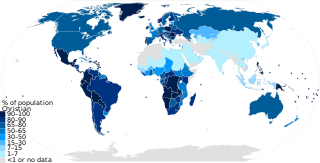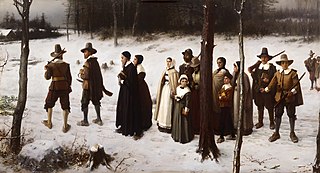Religion in Canada encompasses a wide range of groups and beliefs. Christianity is the largest religion in Canada, with Roman Catholics having the most adherents. Christians, representing 67.2% of the population in 2011, are followed by people having no religion with 23.9% of the total population. Other faiths include Islam (3.2%), Hindus (1.5%), Sikhs (1.4%), Buddhists (1.1%), and Jews (1.0%). Rates of religious adherence are steadily decreasing. The preamble to the Canadian Charter of Rights and Freedoms refers to God. The monarch carries the title of "Defender of the Faith". However, Canada has no official religion, and support for religious pluralism and freedom of religion is an important part of Canada's political culture.

The mainline Protestant churches are a group of Protestant denominations in the United States that contrast in history and practice with evangelical, fundamentalist, and charismatic Protestant denominations. Some make a distinction between "mainline" and "oldline", with the former referring only to denominational ties and the latter referring to church lineage, prestige and influence. However, this distinction has largely been lost to history and the terms are now nearly synonymous.

There are between 800 million and 1 billion Protestants worldwide, among approximately 2.5 billion Christians. In 2010, a total of more than 800 million included 300 million in Sub-Saharan Africa, 260 million in the Americas, 140 million in Asia-Pacific region, 100 million in Europe and 2 million in Middle East-North Africa. Protestants account for nearly forty percent of Christians worldwide and more than one tenth of the total human population. Various estimates put the percentage of Protestants in relation to the total number of the world's Christians at 33%, 36%, 36.7%, and 40%, while in relation to the world's population at 11.6% and 13%.

As of the year 2020, Christianity had approximately 2.38 billion+ adherents out of a worldwide population of about 7.8 billion people. It represents nearly one-third of the world's population and is the largest religion in the world, with the three largest groups of Christians being the Catholic Church, Protestantism, and the Eastern Orthodox Church. The largest Christian denomination is the Catholic Church, with 1.3 billion baptized members. The second largest Christian branch is either Protestantism, or the Eastern Orthodox Church.
Serbia has been traditionally a Christian country since the Christianization of Serbs by Clement of Ohrid and Saint Naum in the 9th century. The dominant confession is Eastern Orthodoxy of the Serbian Orthodox Church. During the Ottoman rule of the Balkans, Sunni Islam established itself in the territories of Serbia, mainly in southern regions of Raška and Preševo Valley, as well as in the disputed territory of Kosovo and Metohija. The Catholic Church has roots in the country since the presence of Hungarians in Vojvodina, while Protestantism arrived in the 18th and 19th century with the settlement of Slovaks in Vojvodina.

Christianity in Africa arrived in Egypt in the middle of the 1st century. By the end of the 2nd century it had reached the region around Carthage. In the 4th century, the Aksumite empire in modern-day Tigray and became one of the first regions in the world to adopt Christianity as an official religion and the Nubian kingdoms of Nobatia, Makuria and Alodia followed two centuries later. The origin was mostly Coptic Christianity. Important Africans who influenced the early development of Christianity include Tertullian, Perpetua, Felicity, Clement of Alexandria, Origen of Alexandria, Cyprian, Athanasius and Augustine of Hippo.

Christianity is the most prevalent religion in the United States. Estimates suggest that between 65% to 75% of the US population is Christian. The majority are Protestant Christians and Roman Catholics and other minorities of Mormons, Orthodox and Jehovah's Witnesses. The Public Religion Research Institute's "2020 Census of American Religion", carried out between 2014 and 2020, showed that 70% of Americans identified as Christian during this seven-year interval. In a 2020 survey by the Pew Research Center, 65% of adults in the United States identified themselves as Christians. They were 75% in 2015 70.6% in 2014, 78% in 2012, 81.6% in 2001, and 85% in 1990. About 62% of those polled claim to be members of a church congregation. The United States has the largest Christian population in the world and, more specifically, the largest Protestant population in the world, with nearly 230 to 250 million Christians and, as of 2019, over 150 million people affiliated with Protestant churches, although other countries have higher percentages of Christians among their populations. The modern official motto of the United States of America, as established in a 1956 law signed by President Dwight D. Eisenhower, is "In God We Trust". The phrase first appeared on U.S. coins in 1864.

Christians in Nigeria comprise an estimated 49.3% of the population. Christians are dominant in the southern (south-east/south-south/South west and central region in Nigeria. According to the Pew Research Center, Nigeria has the largest Christian population of any country in Africa, with more than 80 million persons in Nigeria belonging to the church with various denominations. The majority of Christians in Nigeria are Protestant.
Religion in South America has been a major influence on art, culture, philosophy and law. Christianity is the main religion, with Roman Catholics having the most adherents. Sizeable minorities of non-religious people and adherents of other religions are also present.

Christianity in Uzbekistan is a minority religion, accounting for 2.3% of the population or 630,000 according to a 2010 study by Pew Research Center.

Christianity is the largest religion in Venezuela, with Roman Catholicism having the most adherents.

Estonia, historically a Lutheran Protestant nation, is today one of the "least religious" countries in the world in terms of declared attitudes, with only 14 percent of the population declaring religion to be an important part of their daily life.
Religion in the Bahamas is dominated by various Christian denominations and reflects the country's diversity. Since the English colonization, most Bahamians adhere to diverse Protestant denominations with Baptist churches/Evangelicals, Pentecostalism, Adventism and Methodism being at the forefront. There is no state religion in the Bahamas, and there is generally free practice of religious beliefs.

Protestantism in Italy comprises a minority of the country's religious population.

Protestantism is the largest grouping of Christians in the United States, with its combined denominations collectively comprising about 43% of the country's population in 2019. Other estimates suggest that 48.5% of the U.S. population is Protestant. Simultaneously, this corresponds to around 20% of the world's total Protestant population. The U.S. contains the largest Protestant population of any country in the world. Baptists comprise about one-third of American Protestants. The Southern Baptist Convention is the largest single Protestant denomination in the U.S., comprising one-tenth of American Protestants. Twelve of the original Thirteen Colonies were Protestant, with only Maryland having a sizable Catholic population due to the Lord of Baltimore's religious tolerance.

Sierra Leone is officially a secular state, although Islam and Christianity are the two main and dominant religions in the country. The constitution of Sierra Leone provides for freedom of religion and the Sierra Leone Government generally protects it. The Sierra Leone Government is constitutionally forbidden from establishing a state religion, though Muslim and Christian prayers are usually held in the country at the beginning of major political occasions, including presidential inauguration.
Developed countries with modern, secular educational facilities in the post-World War II era have shifted towards post-Christian, secular, globalized, multicultural and multifaith societies. Christianity currently remains the predominant religion in Latin America, Western Europe, Canada and the United States. However, the religion is declining in Western Europe, North America and some countries of Oceania.











